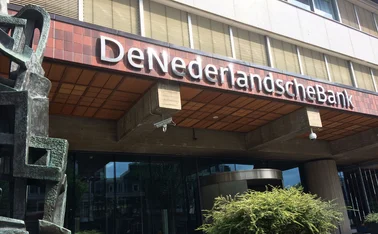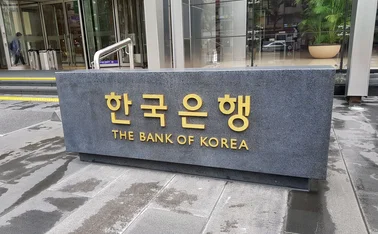
CB.com panel discusses changes in reserve management functions
Panellists on Central Banking's second ON AIR policy forum said the role of central bank reserve managers has changed immensely as a result of the financial crisis.
Bill Allen, a visiting senior fellow at Cass Business School and specialist adviser to the House of Commons Treasury Committee; Gary Smith the head of central banks, supranational institutions and sovereign wealth funds at BNP Paribas; and Rachel Ziemba, the director of central and eastern Europe, middle eastern Africa and global macroeconomic issues at Roubini Global Economics, joined Nick Carver, publisher of Central Banking Publications, for panel discussion in London.
"The financial crisis has changed the job of a reserve manager enormously," said Allen. "Before the crisis I don't think that in most central banks reserve managers were at the heart of decision-making, some had even outsourced their reserve management to commercial investment management companies."
After the crisis, Allen said, everything changed. As commercial banks in many countries found themselves short of foreign currency liquidity, "it was obviously in the interests of financial stability for someone to relieve that shortage," said Allen. "In the event the Federal Reserve and other central banks provided swaplines, but if it were to happen again you can't be certain the swaplines would be available. Then the only thing central banks would have to fall back on would be their own foreign exchange reserves."
This means that central banks have "suddenly seen that their reserves might be crucial to maintaining financial stability and that is a new perception that they didn't really have before", said Allen.
Smith agreed that the job of a reserve manager had altered. Now, he said there was "increased pressure on reserve managers not to lose any money and, in fact, to earn more money, to reach for yield. They have been asked to take less risk and think more about currency evolution going forward, as most are invested in a currency that is forecasted to depreciate over time. It's a conundrum".
Ziemba said a significant dilemma is that reserve managers "are also having to deal with alternatives that might be even more risky". Furthermore, in some emerging economies, she said that reserve managers are "having to carry out attempts to smooth out volatility in exchange rate or be the vehicle of managing the assets that have been accumulated once the central banks have intervened," which adds another level to their responsibilities.
The panellists discussed the shifting portfolios of central banks' reserves. Many are moving away from high-risk assets.
Nevertheless, Allen said central banks' reserve behaviour remains diverse: "Some have quite small reserves and others have absolutely enormous reserves, far more than they would ever possibly need for liquidity purposes."
Ziemba said that "even central banks with large reserves moved out of higher risk assets during the crisis".
The group also touched on the distinction between reserves management and sovereign wealth funds and the inevitable competition between the two. Smith mused on whether there could be a "more efficient way to divvy up responsibilities" in countries that have sovereign wealth funds and dedicated reserve managers.
Smith thought "mission clarity" was a problem for sovereign investors in many countries.
All the panellists agreed that there is no longer such a thing as a risk-free asset. This, Allen said, means "sovereign investors have to think harder than before about what they want the money for. If it's liquidity, that's fine, that's clear. If it is a sovereign wealth fund then maybe they are worried about pension liabilities or another specific reason. But just piling up money because you can't think what to do with it is becoming increasingly less attractive because if something goes wrong and you lost it, you are really in trouble".
Faced with the claim that reserve managers had contributed to financial stability issues in other countries by their actions of shifting assets around during the crisis, the panellists accepted this was probably the case.
"The only way to prevent that would be some sort of international coordination of reserve management, to manage withdrawal from bank deposits," said Allen. "But there's no machinery for that and the interests of the various countries involved are extremely divergent, so I don't think there was any realistic chance of that happening."
With rocketing gold prices featuring heavily in headlines in recent months, the debate naturally came round to this topic in terms of reserve holdings.
"The key driver in gold purchases is higher reserves," said Smith. The idea that the crux of the issue was in fact the absence of sales of the precious metal rather than the relatively limited purchases by central banks also arose.
Allen thought that by buying gold, central banks were taking tail risk into account, hedging against a worst-case scenario. Ziemba pointed that is if every central bank were to follow best practice guidelines on the percentage of their reserves that should be held in gold, we would quickly discover there wasn't enough to go around.
Currency evolution was a recurring theme in the discussion, as the dollar and euro have deteriorated, Smith said a variety of other currencies have benefited. These included the Australian dollar, the Canadian dollar, the Scandinavian currencies, new emerging market currencies in Asia and the Chinese renminbi.
Ziemba said that several central banks in Africa have been talking about wanting an exposure to the renminbi. Several central banks across Asia already have an exposure, she added. The reasons for this was that China is becoming a major trade partner to many of these jurisdictions and the fact that "everyone is searching for yield," she said.
Allen lamented the lack of a secure legal structure in China. "The big thing against the renminbi is the absence" of such a system, he said. "You wouldn't want to commit a very large amount just because of legal risk. Until they can sort that out, the renminbi will remain peripheral."
The panellists also said there was a big question regarding how comfortable China itself was with so many countries expressing an interest in holding its national currency as part of their reserve holdings.
Click here to view the full online discussion.
Only users who have a paid subscription or are part of a corporate subscription are able to print or copy content.
To access these options, along with all other subscription benefits, please contact info@centralbanking.com or view our subscription options here: http://subscriptions.centralbanking.com/subscribe
You are currently unable to print this content. Please contact info@centralbanking.com to find out more.
You are currently unable to copy this content. Please contact info@centralbanking.com to find out more.
Copyright Infopro Digital Limited. All rights reserved.
As outlined in our terms and conditions, https://www.infopro-digital.com/terms-and-conditions/subscriptions/ (point 2.4), printing is limited to a single copy.
If you would like to purchase additional rights please email info@centralbanking.com
Copyright Infopro Digital Limited. All rights reserved.
You may share this content using our article tools. As outlined in our terms and conditions, https://www.infopro-digital.com/terms-and-conditions/subscriptions/ (clause 2.4), an Authorised User may only make one copy of the materials for their own personal use. You must also comply with the restrictions in clause 2.5.
If you would like to purchase additional rights please email info@centralbanking.com







